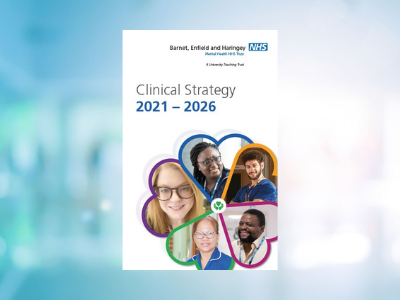Barnet, Enfield and Haringey (BEH) Mental Health NHS Trust has launched its latest clinical strategy. Covering five years, from 2021 – 2026, the strategy has been co-created by service users, carers, staff and partners.
Its clinical principles are as follows:
- People at the heart – services will be ‘person-centred’ and ‘delivered according to the needs and preferences of people, families and carers’.
- Whole person, consistent care – ‘whole-person care based on an ‘understanding of physical, psychological, social, emotional and spiritual needs’.
- Kindness matters – aiming to deliver ‘compassionate, psychologically informed care that acknowledges the positive impact that kindness has on wellbeing and health outcomes’, as well as creating ‘space and systems that prioritise compassion’.
- Accessible and flexible, recovery-focused and inclusive – offering ‘care which works for all – in the right place, at the right time’ and which is ‘accessible culturally, physically and psychologically’; to be able to flex ‘boundaries, protocols and procedures’ to ‘ensure that every person gets a seamless and high quality service’; to provide care that reflects the diversity of the population that BEH serves; and support people to develop skills to help themselves stay well.
- Providing safety – prioritising the safety of people who access services, as well as staff and communities, within a ‘just and learning culture’ where ‘reporting concerns and learning from feedback, errors and incidents is embedded in a psychologically safe environment’.
- Addressing inequalities – providing care that aims to ‘recognise and eliminate health and social inequalities’ to improve outcomes and experiences.
- Open, honest, trustworthy and transparent – ‘put people first and ensure that no decision about them is taken without them’; listen and maintain a professional, respectful and non-judgmental manner; keep a ‘proactive and positive’ clinical approach with a ‘focus on prevention, early intervention and prompt input’.
- Best evidence and outcome focused – using ‘reasoned decision making’ to offer services based on the ‘best available evidence and research’, and ‘in line with national best practice’; where evidence is not yet available, ‘actively engage with research’ to develop services; focus on holistic and personalised outcomes.
- Relationship focused – acknowledge the ‘centrality of positive, therapeutic, trusting relationships in achieving positive outcomes’; prioritise relationship continuity to ‘enable people to benefit from meaningful connections’; reduce the need for peoole to repeat their stories and provide a ‘smooth and seamless journey’ where patients are ‘not passed around between services or clinicians.’
- Collaborative and co-produced – aim to ‘design and deliver care in an equal partnership’ between patients and professionals; aim to make sure that power is shared; have an approach of ‘working with’ rather than ‘doing to’ people.
The mental health trust says these principles will help it achieve its clinical priorities for the next five years, which include “transforming urgent, crisis and community care for both adults and children”, as well as developing physical health services, and “maintaining excellence” in its specialist services.
“We recognise there is more to be done to address health inequalities across our three boroughs”, wrote Dr Mehdi Veisi, Medical Director at the trust. “Until we have achieved this,” he added, “we cannot be confident that our new clinical services are available to everyone who needs them. We pledge to continue to lead on ensuring equality and inclusion in health and being innovative and bold in our ideas to implement our vision for integrated healthcare.”
He added that the strategy “places equal importance on mental and physical health”, confirms the trust’s commitment to using new digital technologies to “address poor mortality rates in mental health patients” and to improve outcomes for all patients, and commits to”‘reducing variation in care and access to treatment.”
Meanwhile, the trust’s overall clinical priorities include: improving the urgent and crises adult and older adult mental health pathway; transforming the community mental health model for adults and older adults; transforming the community mental health model for children and young people; developing sustainable community physical health services that can be integrated with mental health; and maintaining ‘world-class excellence and reputation’ in specialist services.
You can download the full BEH Clinical Strategy here.



